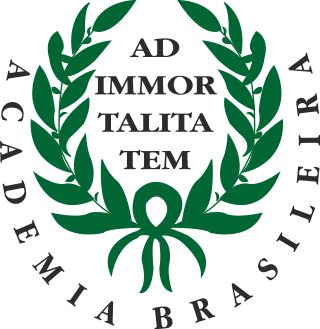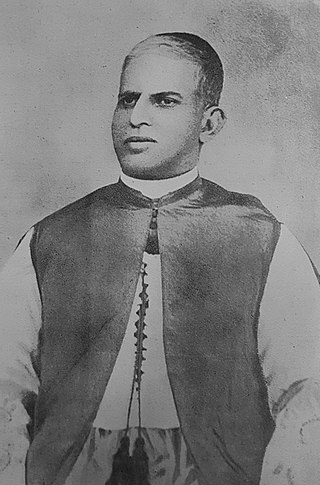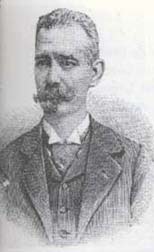Related Research Articles


Henrique Maximiano Coelho Neto was a Brazilian writer and politician. He founded and occupied the second chair of the Brazilian Academy of Letters, from 1897 until his death in 1934. He was also the president of the aforementioned Academy in 1926.
A Portuguese name or Lusophone name – a personal name in the Portuguese language – is typically composed of one or two personal names, the mother's family surname and the father's family surname. For practicality, usually only the last surname is used in formal greetings.

Estremenho is a dialect of European Portuguese spoken in the former provinces of Estremadura and Beira Litoral and is part of the central-southern dialects.

Msgr Sebastião Rodolfo Dalgado was a Catholic priest, academic, university professor, theologian, orientalist, and linguist from Portuguese Goa.

Aniceto dos Reis Gonçalves Viana was a Portuguese writer and orientalist, who led a committee that made reforms of Portuguese orthography to make it more phonetic.
Augusto Carlos Teixeira de AragãoComA • CavC • CavA • CavTE was a Portuguese officer, doctor, numismatist, archaeologist and historian. As an officer of the Portuguese army, he retired with the rank of general. Teixeira de Aragão is considered one of the "fathers" of Portuguese numismatics.
Events in the year 1914 in Portugal.

Events in the year 1899 in Brazil.
The Ultimate Fighter: Brazil 3 is an installment of the Ultimate Fighting Championship (UFC)-produced reality television series The Ultimate Fighter. It is the sixth series to be produced outside the United States and the third to film in Brazil.
Miguel Vicente de Abreu was a Goan historian, a minor official of the Imprensa Nacional. He belonged to the group of Goan intellectuals who were trained and sponsored by Cunha Rivara while he was the state secretary of State of Portuguese India.
Maurício José Ferreira da Costa de Abreu is a Portuguese photographer, editor and cultural producer. He is a leading name in Portuguese photography, as a specialist in the areas of natural and cultural patrimony, ethnography and traditional architecture.

The Constituent Cortes of 1820, formal title The General and Extraordinary Cortes of the Portuguese Nation, also frequently known as the Sovereign Congress or the Cortes Constituintes Vintistas, was the first modern Portuguese parliament. Created after the Liberal Revolution of 1820 to prepare a constitution for Portugal and its overseas territories, it used a different system from the traditional General Cortes for choosing representatives, and the three traditional feudal estates no longer sat separately. The Cortes sat between January 24, 1821 and November 4, 1822 at the Palácio das Necessidades in Lisbon. The work of the Constitutional Cortes culminated in the approval of the Portuguese Constitution of 1822.

Amor de Mãe is a Brazilian telenovela produced and broadcast by TV Globo. It premiered on 25 November 2019, replacing A Dona do Pedaço, and ended on 9 April 2021. The series is written by Manuela Dias, with the collaboration of Mariana Mesquita, Roberto Vitorino and Walter Daguerre.
António Pereira Cândido de Figueiredo, usually referred to as Cândido de Figueiredo was a Portuguese lawyer and civil servant by trade who later became well-known as a writer, lexicographer, grammarian, and philologist specializing in the Portuguese language.
The Orthographic Reform of 1911 was an initiative to standardize and simplify the writing of the Portuguese language in Portugal in 1911.
References
- ↑ Aniceto dos Reis Gonçalves Viana, cvc.instituto-camoes.pt. Retrieved April 2010.
- ↑ ACADEMIA DAS CIÊNCIAS DE LISBOA. Retrieved April 2010.
- ↑ Bases da ortografia portuguesa, full text. Retrieved April 2010.